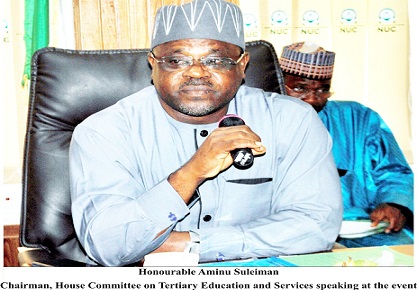
The Chairman, House Committee on Tertiary Education and Services, Honourable Aminu Suleiman, has described as an anomaly that some of the newly established Federal Universities are operating without an enabling Act of the National Assembly.
He said this last Tuesday, when he led other members of the Committee on a routine oversight visit to the National Universities Commission (NUC), where he noted that the essence of the regular interface was to ensure that MDAs were operating within their mandate.
Honourable Aminu, disclosed that the present 12 federal Universities were established in 2012 without laws establishing them. He lamented that it was wrong for government to continue perpetuating such illegality without recourse to an Act of the National Assembly. He urged the NUC to intervene and to prevail on the appropriate authorities to ensure that the bills for the 12 universities and others recently established were brought to the National Assembly for passage.
He also decried the non-uniformity of academic calendars and activities across the Nigerian Universities System (NUS), which, he argued, had portrayed the tertiary institutions in the country in a bad light. He called on the leadership of the NUC to collaborate with Vice Chancellors of Nigerian universities to ensure a uniform academic calendar .
The House Committee Chairman also informed the Executive Secretary, that his Committee was in receipt of complaints, indicating that students who had graduated from the Nigeria Police Academy (NPA), Wudil, were yet to receive their certificates from the school authorities. He insisted that such practice must not be allowed to continue as certificates were not only the property, but also a proof that the students were graduates of that institution.
In his words, “the purpose for establishing the NPA, Wudil was to catch the boys young, change their perception academically, and ensure they fit in perfectly well into the Police Force and also create a new image for the Force. We should avoid a situation whereby the graduates will become demoralised and cannot give their best to the service of the Nation”.
He noted that since his emergence as the chair in the House of Representatives in 2007, the Committee had continually engaged the Commission in the performance of its mandate and had mediated during industrial disputes between the Federal Government and the University-based unions. He assured that the Committee under his leadership would continue to play its role in order to take tertiary education in Nigeria to greater heights.
Hon. Suleiman commended the Executive Secretary and his management team for their efforts in repositioning the Nigerian Universities System (NUS), stressing that reforms, especially the type initiated under the present leadership were needed to place the NUS at par with their counterparts around the globe.
A member of the Committee, representing Kaltungo/Shongom Federal Constituency, Honourable Karu Simon Elisha, called on the NUC to consider leadership education as a course to be taught in universities in its on-going curriculum review.
According to him, in his own capacity, he had organised series of leadership development training for youths in the North-East region and hoped that such could be replicated in tertiary institutions so as to fully equip the youth for leadership in future.
He recounted that since 2009 he started a leadership model to support leadership development of secondary school students and had by 2013 moved it to the University level, and it had shown that leadership education need to be incorporated into the University Curriculum. He said that due to his passion for this, he had moved a motion in 2020 on the Floor of the House to accommodate Leadership Development Centres and other amendments, which he noted would need to be explored in the curriculum review.
Welcoming the Committee, the Executive Secretary, NUC, Professor Abubakar Adamu Rasheed, mni, MFR, FNAL, assured them of the Commission’s commitment to ensure delivery of quality University education in Nigeria.
On formalisation of Academic activities in Nigerian Universities, Professor Rasheed, remarked that though the Federal universities enjoyed some degree of autonomy, the Commission was keen on liaising with the Joint Admissions and Matriculation Board (JAMB), to formalise and ensure some level of uniformity in the admission processes and academic timetable.
He explained that the incessant industrial crises in the universities over the years were responsible for the unstable academic calendar in the institutions. He pointed out that efforts to internationalise the University System might not be realised if urgent steps were not taken to resolve the problem, promising that the NUC would continue to engage stakeholders in the sector with a view to stabilising the academic calendar.
The NUC scribe also assured the Committee that the Commission would in the nearest future call for a stakeholders meeting inclusive of the National Assembly Committees on Tertiary Education, Vice Chancellors of Nigerian universities and leadership of all University-based Unions to discuss problems bedevilling the NUS.
He acknowledged that the NUC and the National Assembly Committees were partners in progress, stressing that the House Committee deserved to know why so much progress had not been made and promised to carry the Committee along in seeking a lasting solution to some of these problems. He said the NUC remained resolute to achieving the University System the nation will be proud of.
In a vote of thanks, NUC Deputy Executive Secretary (Academics), Dr. Suleiman Ramon- Yusuf, appreciated the Chairman and members of the House Committee for providing the needed legislative support to the commission, noting that the relationship that existed between the NUC and the Committee was mutually beneficial.
At the meeting were NUC Directors of the Directorate of Finance and Account, Mr. Sam Onazi; Academic Standards, Dr Noel B. Saliu; Public Affairs, Mallam Ibrahim Yakasai; and the Acting Director of Students, Mrs Lauretta Achor.
